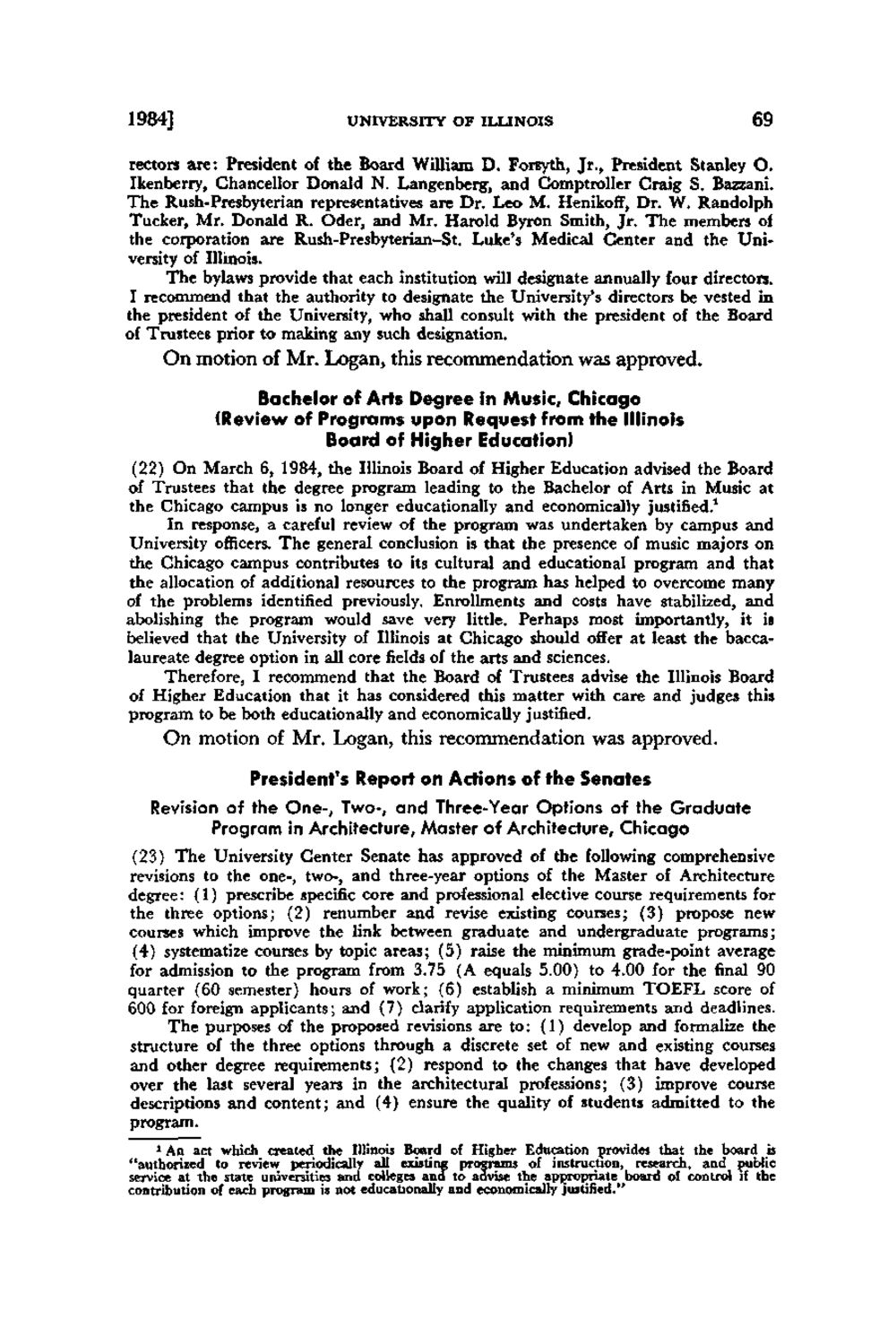| |
| |
Caption: Board of Trustees Minutes - 1986
This is a reduced-resolution page image for fast online browsing.

EXTRACTED TEXT FROM PAGE:
1984] UNIVERSITY OF ILLINOIS 69 rectors a r e : President of the Board William D . ForByth, Jr., President Stanley O . Ikenberry, Chancellor Donald N. Langenberg, and Comptroller Craig S. Bazzani. T h e Rush-Presbyterian representatives are Dr. Leo M. Henikoff, Dr. W. Randolph Tucker, Mr. Donald R. Oder, and Mr. Harold Byron Smith, Jr. T h e members of the corporation are Rush-Presbyterian-St. Luke's Medical Center and the University of Illinois. The bylaws provide that each institution will designate annually four directors. I recommend that the authority to designate the University's directors be vested in the president of the University, who shall consult with the president of the Board of Trustees prior to making any such designation. On motion of Mr. Ix>gan, this recommendation was approved. Bachelor of Arts Degree in Music, Chicago (Review of Programs upon Request from the Illinois Board of Higher Education) (22) On March 6, 1984, the Illinois Board of Higher Education advised the Board of Trustees that the degree program leading to the Bachelor of Arts in Music at the Chicago campus is no longer educationally and economically justified. 1 In response, a careful review of the program was undertaken by campus and University officers. T h e general conclusion is that the presence of music majors on the Chicago campus contributes to its cultural and educational program and that the allocation of additional resources to the program has helped to overcome many of the problems identified previously. Enrollments and costs have stabilized, and abolishing the program would save very little. Perhaps most importantly, it is believed that the University of Illinois at Chicago should offer at least the baccalaureate degree option in all core fields of the arts and sciences. Therefore, I recommend that the Board of Trustees advise the Illinois Board of Higher Education that it has considered this matter with care and judges this program to be both educationally and economically justified. On motion of Mr. Logan, this recommendation was approved. President's Report on Actions of the Senates Revision of the One-, Two-, and Three-Year Options of the Graduate Program in Architecture, Master of Architecture, Chicago (23) The University Center Senate has approved of the following comprehensive revisions to the one-, two-, and three-year options of the Master of Architecture degree: (1) prescribe specific core and professional elective course requirements for the three options; (2) renumber and revise existing courses; (3) propose new courses which improve the link between graduate and undergraduate programs; (4) systematize courses by topic areas; (5) raise the minimum grade-point average for admission to the program from 3.75 (A equals 5.00) to 4.00 for the final 90 quarter (60 semester) hours of work; (6) establish a minimum T O E F L score of 600 for foreign applicants; and (7) clarify application requirements and deadlines. The purposes of the proposed revisions are to: (1) develop and formalize the structure of the three options through a discrete set of new and existing courses and other degree requirements; (2) respond to the changes that have developed over the last several years in the architectural professions; (3) improve course descriptions and content; and (4) ensure the quality of students admitted to the program. 1 An act which created the Illinois Board of Higher Education provides that the board is "authorized to review periodically all existing programs of instruction, research, and public service at the state universities and colleges and to advise the appropriate board of control if the contribution of each program is not educationally and economically justified."
| |